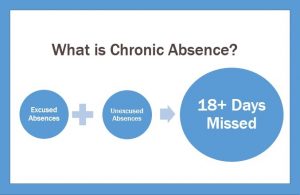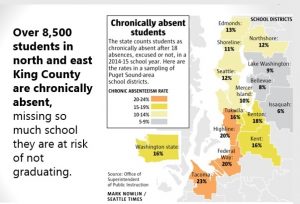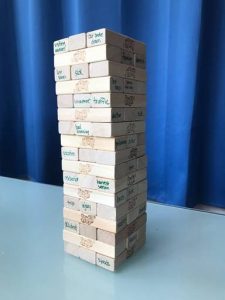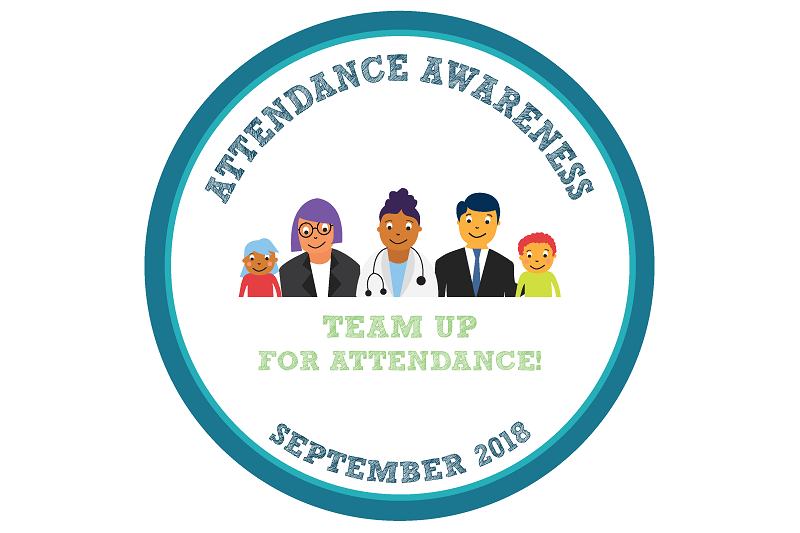More than 4,300 students in the Bellevue and Lake Washington School Districts were “chronically absent,” in the 2016-17 school-year. This means they missed more than 10% of the school year.
 Our region struggles with school absences – and chronic absenteeism is one of the strongest predictors of high school dropout, even as early as the primary grades. Raising awareness about the effects of chronic absenteeism and understanding how we as individuals or organizations can help is critical to reduce absences.
Our region struggles with school absences – and chronic absenteeism is one of the strongest predictors of high school dropout, even as early as the primary grades. Raising awareness about the effects of chronic absenteeism and understanding how we as individuals or organizations can help is critical to reduce absences.
The Attendance collaborative of Eastside Pathways has been actively involved in coordinating strategies and aligning messages for the Attendance Awareness Month campaign that goes out to the community every September. The collaborative held a meeting on June 4 to start planning for this year’s campaign. Led by Cara Ianni from King County Housing Authority, Matt Gillingham from Lake Washington School District, and Glenn Hasslinger from Bellevue School District, the meeting brought together nearly 40 partners serving Bellevue and Lake Washington school districts in a coordinated effort to get the message to parents and the community when the new school year begins.
 “There is a correlation between academic progress and student attendance. Kids that are chronically absent are less likely to pass state assessments or graduate on time as compared to students that come to school every day.”
“There is a correlation between academic progress and student attendance. Kids that are chronically absent are less likely to pass state assessments or graduate on time as compared to students that come to school every day.”
Matt Gillingham, Director, Student Services at Lake Washington School District
WHAT CAN YOU DO TO HELP?
To prepare for the campaign this year, the members of the collaborative met with several stakeholders, including the School Readiness collaborative, parents, medical and mental health providers, out-of-school care providers, and Kindergarten teachers. Some points that came out of the conversations:
- Clarify expectations for families
- Clarify when to stay home, when to come to school and when to get a doctor’s note if sick
- Address family trips
- Motivate student to motivate families to attend school
- Help families establish habits that support good attendances
- Give information on how to access resources
- Developed guidance memo for schools.
At the meeting, some of the partner organizations presented the work they were doing to support this effort.
Bellevue School District ECEAP Program
“We believe students with families who feel connected have better attendance. We have Family Engagement Specialists on site in our ECEAP funded centers to support families with attendance. When issues arise, they look at barriers to attendance such as work schedules, transportation, family culture/philosophy or health issues, and work collaboratively for a solution.” Alicia Brender, Family and Community Development Coordinator – Early and Extended Learning Programs at Bellevue Public Schools.
The Family Engagement Specialists, Preschool Teachers and Center Managers check in with families when students are absent. This year they started taking attendance in Preschool, which is helping them see trends. Last year they the data from their After School Program showed that students who attended the programs had higher attendance rates.
To encourage attendance, the school is planning to present information to all preschool parents about the importance of attendance; analyze preschool student data and reach out to families that are chronically absent; provide activities for parents around evening and bedtime routines; and create systematic way to inform parents when their child’s teacher is absent and who is substituting for the day.
KidsQuest Children’s Museum
 Jami Bonnett, Director of Education, shared a game they had created and used last year with Jenga blocks to talk to parents and children about attendance and how missing school days can affect their learning.
Jami Bonnett, Director of Education, shared a game they had created and used last year with Jenga blocks to talk to parents and children about attendance and how missing school days can affect their learning.
The outside of the block had reasons why children would typically miss school – being sick, doctors appointment, vacation, car troubles, etc. Each child was told a block tower represented their time at school. They had to find six reasons why they would or have missed school and pull out the six blocks. On each block they pulled out, there were facts about how missing school affects learning. The staff then spoke to children and their parents about the effects of missing school.
“As an organization we found that getting the message out t o kindergarten parents is really important. A lot of parents understand the data and the importance of coming to school but they think it really only applies to the older grades and that being absent in kindergarten isn’t that big of a deal,” says Jamie.
They will play the game again this year at the museum during August to reinforce the need for attendance. Jamie and her team will support the Attendance Awareness campaign by posting on social media and hanging a banner outside the museum as everyone heads back to school.
We will be keeping you updated as the campaign moves forward and share activities and programs by our partner organizations.
SOME RESOURCES
Background Information: http://www.attendanceworks.org/chronic-absence/the-problem/
Making the Case: http://www.attendanceworks.org/resources/messaging/making-the-case/
Video: https://vimeo.com/63614396
Attendance Awareness Month: http://awareness.attendanceworks.org/

